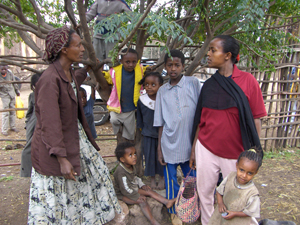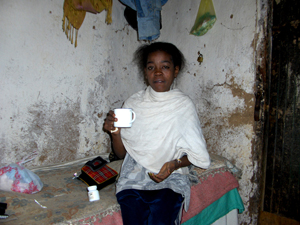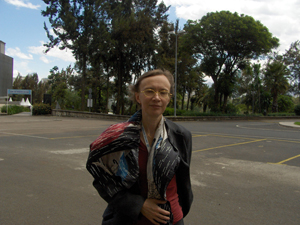Mengistu Asnake is the deputy country representative in Ethiopia for Pathfinder International, a Boston-based charity that supports family planning and reproductive health services in the developing world. In May, he talked in Addis Ababa about the President’s Emergency Plan for AIDS Relief (PEPFAR) funding restrictions, the need to integrate HIV prevention information into family planning programs and the gap between those who decide how aid should be delivered and those who see the reality on the ground firsthand.
Pathfinder is one of the three plaintiffs that successfully challenged the loyalty oath requiring all recipients of federal HIV funding to have a policy “explicitly opposing prostitution and sex trafficking”. In May 2006, U.S. District Courts in New York and Washington, D.C., ruled that the oath violates the First Amendment. The federal government has appealed.
Who funds Pathfinder in Ethiopia?
USAID [U.S. Agency for International Development] is the major donor. Approximately 80 percent of our funding comes from USAID. Additional funds come from Packard and the Swedish International Development Agency.
Has family planning funding by the U.S. government declined in the past few years?
There is a major shift from population funding [family planning] to HIV funding. There’s a huge growth of funding for HIV. [The] PEPFAR budget is $250 million for Ethiopia, and population [family planning] money is not even $20 million. So there’s a growth in the population money, but it’s a relative growth when you compare it to the demand, the need for those services. There’s difficulty integrating reproductive health programs with HIV programs. There are very strict rules and regulations for HIV programs and PEPFAR says you may not use those funds for family planning services. But PMTCT [Prevention of Mother to Child Transmission of HIV] services are services for women and you could provide them with family planning and improve the service.
Why didn’t Pathfinder get PEPFAR money?
PEPFAR people didn’t consider our organization a priority for that type of activity.
I don’t know very well what the reason was for this. But we believe that you cannot separate the two types of programs [family planning and HIV]. With the increase in the number of unwanted pregnancies, two things can happen. [Performing] abortions in unsafe conditions … increases mobility from different diseases, and people can get HIV in the procedure. The second thing is the huge percentage of deaths in this country due to abortions — 30 to 35 percent of mother mortality is related to abortion.
With an increased population and family size, there’s also migration, poverty and the risk of [women] resorting to commercial sex working. A poor woman can be exposed to any sexual behaviors or risks to get money, and that’s a risk factor for HIV. In general, by minimizing family planning you increase the risk of getting HIV.
How do you feel about the U.S. government emphasis on abstinence programs and the whole controversy around ABC?
We think that information should be provided; information shouldn’t be limited. There’s a good principle in family planning: you can’t force people to use a certain method. The whole issue is [to] give them a broad spectrum of information [and] proper counseling, tell them their rights, then [the] decision is theirs. Now, by funding certain groups for AB and certain groups for C, we are telling them to do only one thing or the other. In the rural or semi-urban areas where we work and see the everyday problems we are advising all the different choices. The problem is when the higher levels — people who never saw the problem — are telling people don’t do this. For me I can only say that it’s like telling somebody to put his hands in the fire. And knowing that that person could be harmed by the fire, we are not given him or her any protection. Yes, it’s possible, people can abstain. But when you know people are not abstaining and are not faithful, then what other advice would you give them?
Do abstinence programs work in Ethiopia?
It’s very difficult. For some it [AB] may work and for most of them … let me give you an example. A young woman who doesn’t have any economic opportunity… when she knows that by having sex with someone she can get money, how can you tell her to abstain? [PEPFAR doesn’t provide economic options]. For a young boy in school who may fall in love with one of the girls, what’s the issue with telling him abstain from sex when the physiology call, the anatomy call are working there? People look at what the reality is versus what we are telling them. Our training includes all options. AB and C, otherwise the chances of getting the infection will be higher.
Some PEPFAR partners are critical of the U.S. government rules and requirements. Are these feelings shared by groups working on family planning?
Even in family planning there are certain pressures. In HIV work [PEPFAR controls] use of language. If you are working with commercial sex workers and you put them in a program, you have to call them “prostitutes.” Some are even changing their name to poor women or things like that. They believe that if we call them “commercial sex workers,” we are encouraging them.
Also [there is] the “Mexico City policy”: If you are using any money to support abortion, you are not eligible for U.S. government money. Our partners have to sign the agreement. Marie Stoppes and Family Guidance Association of Ethiopia are getting money from other donors, but it’s not only the money that matters. It’s also the technical support that they used to get from the U.S. government.
What’s the situation with access to family planning in Ethiopia?
We did two demographic surveys [on family planning use], one in 2000 and one in 2005: First one was 8 percent [of women saying they use family planning]; second one was 15 percent — we have doubled. The progress is more than 1.5 percent increase per year, which is very unique in a developing country. There’s more demand, and people are using family planning. The unmet need is very high, like 36 percent. For the long-term family planning [methods], you need skilled health workers to do them. Currently, injectables are high in demand. In many areas there are a lot of women who are demanding long-term methods.
How many people do you reach with your programs?
In our family planning programs we have 700,000 to 800,000 new clients every year. We are supporting the programs for commercial sex workers with SIDA [Swedish International Developing Agency] money. Years ago, we were funding another organization working with commercial sex workers; we used HIV money from USAID. But after PEPFAR, we couldn’t continue because we are not getting HIV funding. We were told [by the U.S. government] that we can’t do HIV-related activities. PEPFAR doesn’t fund income-generation activity programs [for commercial sex workers]. I have heard that the reason behind it is [the belief] that if you fund those programs, you will have more and more commercial sex workers to serve.
But if you give commercial sex workers an economic alternative, they might actually be able to leave the streets …
My big question is how many of the people who are making these decisions know how people are affected. They [recipients] are changing their lives if they get minimum support from us … you can see it in the Sisters’ Self-Help Association. They were commercial sex workers, and they left that life and started small businesses.
The basic thing is what the reality in the ground is versus the rule coming from another country. If they don’t get economic support, how can they abstain? Clearly, we can go to the streets and ask them. They will say: “HIV may kill me in five years, but today my family — my sister, mother — have nothing to eat. So, do you think I am worried about getting HIV when there are people that are on the verge of death?”
How do you see the future?
Programs should relate to reality. Today, you can’t reach STI [sexually transmitted infection] people unless they are HIV.
What do you think about religious groups doing HIV prevention?
It’s good to work with all type of organizations, but if they have a limited thinking and a limited approach … The money should be balanced. A lot of money is going to organizations that only advocate for abstinence and fidelity. There are youth groups, women’s groups who can do tremendous jobs, who can make a big difference — a change.
Pathfinder used to partner with the Ethiopian Orthodox Church. Are you still working with them?
We are not working with Ethiopian Orthodox Church at the time. All decisions [on program dictates] are made high in the [church] hierarchy. In the past, when we partnered, they didn’t talk about condoms. They didn’t raise the issue. But now some of them are saying that condoms may be increasing the transmission of HIV, encouraging people to have sex.




